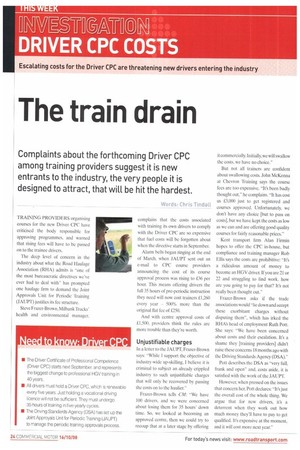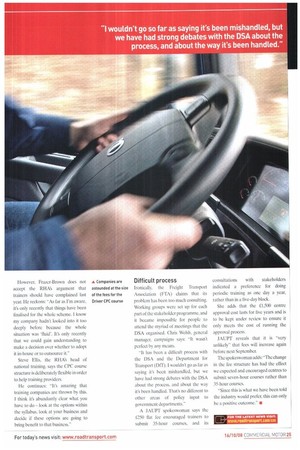The train drain
Page 24

Page 25

If you've noticed an error in this article please click here to report it so we can fix it.
Complaints about the forthcoming Driver CPC among training providers suggest it is new entrants to the industry, the very people it is designed to attract, that will be hit the hardest.
Words: Chris Tindall
TRAINING PROVIDERS organising courses for the new Driver CPC have criticised the body responsible for approving programmes, and warned that rising fees will have to be passed on to the trainee drivers.
The deep level of concern in the industry about what the Road Haulage Association (RHA) admits is -one of the most bureaucratic directives we've ever had to deal with" has prompted one haulage firm to demand the Joint Approvals Unit for Periodic Training (JAUPT) justifies its fee structure.
Steve Frazer-Brown, Milbank Trucks' health and environmental manager, complains that the costs associated with training its own drivers to comply with the Driver CPC are so expensive that fuel costs will be forgotten about when the directive starts in September.
Alarm bells began ringing at the end of March, when JAUPT sent out an e-mail to CPC course providers announcing the cost of its course approval process was rising to £36 per hour. This means offering drivers the full 35 hours of pre-periodic instruction they need will now cost trainers £1,260 every year 500% more than the original flat fee of £250.
And with centre approval costs of £1,500, providers think the rules are more trouble than they're worth.
Unjustifiable charges
In a letter to the JAUPT, Frazer-Brown says: "While I support the objective of industry-wide up-skilling, I believe it is criminal to subject an already crippled industry to such unjustifiable charges that will only be recovered by passing the costs on to the haulier."
Frazer-Brown tells CM: "We have 100 drivers, and we were concerned about losing them for 35 hours' down time. So, we looked at becoming an approved centre, then we could try to recoup that at a later stage by offering it commercially. Initially, we will swallow the costs, we have no choice."
But not all trainers are confident about swallowing costs. John McKenna at Chevron Training says the course fees are too expensive. "It's been badly thought out," he complains. "It has cost us £3,000 just to get registered and courses approved. Unfortunately, we don't have any choice [but to pass on costs], but we have kept the costs as low as we can and are offering good quality courses for fairly reasonable prices."
Kent transport firm Alan Firmin hopes to offer the CPC in-house, but compliance and training manager Rob Ellis says the costs are prohibitive: "It's a ridiculous amount of money to become an HGV driver. If you are 21 or 22 and struggling to find work, how are you going to pay for that? It's not really been thought out."
Frazer-Brown asks if the trade associations would "Lie down and accept these exorbitant charges without disputing them-, which has irked the RHA's head of employment Ruth Pott. She says: "We have been concerned about costs and their escalation. It's a shame they [training providers] didn't raise these concerns 18 months ago with the Driving Standards Agency (DSA)."
Pott describes the DSA as "very full, frank and openand, costs aside, it is satisfied with the work of the JAUPT.
However, when pressed on the issues that concern her. Pott declares: -It's just the overall cost of the whole thing. We argue that for new drivers, it's a deterrent when they work out how much money they'll have to pay to get qualified. It's expensive at the moment, and it will cost more next year."
However. Frazer-Brown does not accept the RHA's argument that trainers should have complained last year. He reckons: "As far as I'm aware, it's only recently that things have been finalised for the whole scheme. I know my company hadn't looked into it too deeply before because the whole situation was 'fluid'. It's only recently that we could gain understanding to make a decision over whether to adopt it in-house or to outsource it."
Steve Ellis, the RHA's head of national training, says the CPC course structure is deliberately flexible in order to help training providers.
He continues: "It's amazing that training companies are thrown by this. I think it's abundantly clear what you have to do look at the options within the syllabus, look at your business and decide if these options are going to bring benefit to that business." Difficult process
Ironically, the Freight Transport Association (IFTA) claims that its problem has been too much consulting. Working groups were set up for each part of the stakeholder programme, and it became impossible for people to attend the myriad of meetings that the DSA organised. Chris Welsh, general manager, campaigns says: "It wasn't perfect by any means.
"It has been a difficult process with the DSA and the Department for Transport (DfT). I wouldn't go as far as saying it's been mishandled, but we have had strong debates with the DSA about the process, and about the way it's been handled. That's no different to other areas of policy input to government departments."
A JAUPT spokeswoman says the £250 flat fee encouraged trainers to submit 35-hour courses, and its consultations with stakeholders indicated a preference for doing periodic training as one day a year, rather than in a five-day block.
She adds that the £1,500 centre approval cost lasts for five years and is to be kept under review to ensure it only meets the cost of running the approval process.
JAUPT reveals that it is "very unlikely" that fees will increase again before next September.
The spokeswoman adds: "The change in the fee structure has had the effect we expected and encouraged centres to submit seven-hour courses rather than 35-hour courses.
-Since this is what we have been told the industry would prefer, this can only be a positive outcome." •
















































































































































































